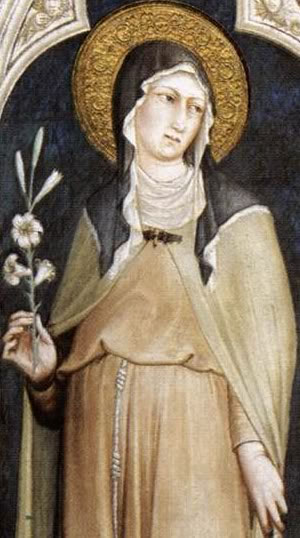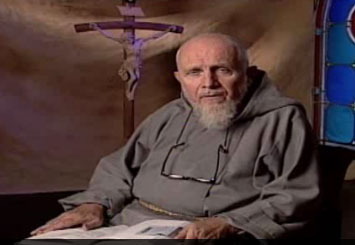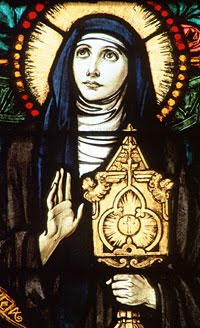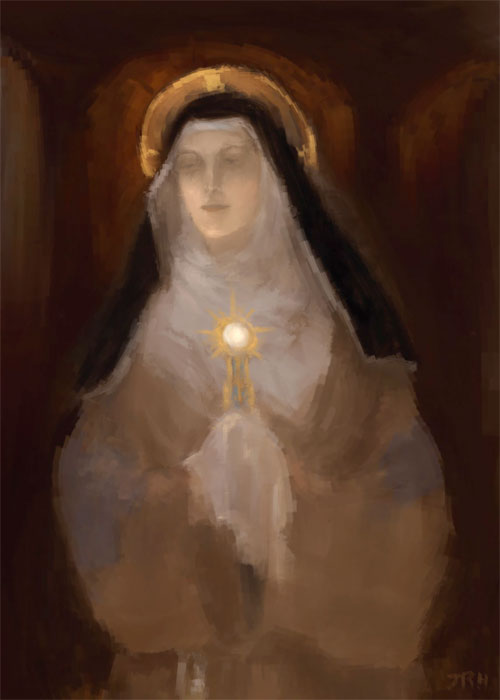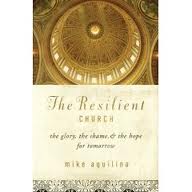The Fifth Way of Prayer
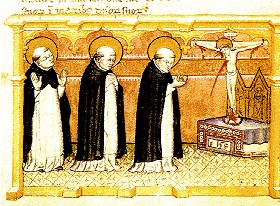 When he was in the convent, our holy father Dominic would sometimes remain before the altar, standing erect without supporting himself or leaning upon anything. Often his hands would be extended before his breast in the manner of an open book; he would stand with great reverence and devotion as if reading in the very presence of God. Deep in prayer, he appeared to be meditating upon the words of God, and he seemed to repeat them to himself in a sweet voice. He regularly prayed in this way for it was Our Lord’s manner as Saint Luke tells us: “. . . according to his custom he entered the synagogue on the Sabbath and began to read” [Luke 4:16]. The psalmist also tells us that “Phinees stood up and prayed, and the slaughter ceased” [Ps. 105:30].
When he was in the convent, our holy father Dominic would sometimes remain before the altar, standing erect without supporting himself or leaning upon anything. Often his hands would be extended before his breast in the manner of an open book; he would stand with great reverence and devotion as if reading in the very presence of God. Deep in prayer, he appeared to be meditating upon the words of God, and he seemed to repeat them to himself in a sweet voice. He regularly prayed in this way for it was Our Lord’s manner as Saint Luke tells us: “. . . according to his custom he entered the synagogue on the Sabbath and began to read” [Luke 4:16]. The psalmist also tells us that “Phinees stood up and prayed, and the slaughter ceased” [Ps. 105:30].
He would sometimes join his hands, clasping them firmly together before eyes filled with tears and restrain himself. At other times he would raise his hands to his shoulders as the priest does at Mass. He appeared then to be listening carefully as if to hear something spoken from the altar. If one had seen his great devotion as he stood erect and prayed, he would certainly have thought that he was observing a prophet, first speaking with an angel or with God himself, then listening, then silently thinking of those things which had been revealed to him.
On a journey he would secretly steal away at the time for prayer and, standing, would immediately raise his mind to heaven. One would then have heard him speaking sweetly and with supreme delight some loving words from his heart and from the riches of Holy Scripture which he seemed to draw from the fountains of the Savior. The friars were very much moved by the sight of their father and master praying in this manner. Thus, having become more fervent, they were instructed in the way of reverent and constant prayer: “Behold as the eyes of servants are on the hands of their masters, as the eyes of the handmaid are on the hands of her mistress . . .” [Ps. 122:2].
The text was taken from the book St. Dominic: Biographical Documents, edited by Fr. Francis C. Lehner, O.P. The chapter “The Nine Ways of Prayer of St. Dominic” was translated by Fr. Andrew Kolzow, O.P.
“The Nine Ways of Prayer of St. Dominic” from St. Dominic: Biographical Documents, © 1964 by The Thomist Press.
Nihil obstat: Reverend A. D. Lee, O.P. Censor Deputatus
Imprimatur: Patrick A. O’Boyle Archbishop of Washington
April 29,1964
For the complete list visit: Â 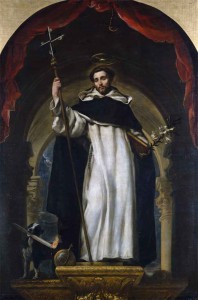
The Nine Ways of Prayer of St. Dominic
Tags: catholic, catholic podcast, catholic prayer, cathollc spirituality
This entry was posted on Tuesday, August 5th, 2014 at 6:43 am
You can follow any responses to this entry through the RSS 2.0 feed.
[powerpress]
From a letter to St. Agnes of Prague
Consider also the midst of his life, his humility, or at least his blessed poverty, the countless hardships, and the punishments that he endured for the redemption of the human race. Indeed, ponder the final days of this mirrored one, contemplate the ineffable love with which he was willing to suffer on the tree of the cross and to die there a kind of death that is more shameful than any other. That mirror suspended upon the wood of the cross from there kept urging those passing by of what must be considered, saying: O all you who pass by this way, look and see if there is any suffering like my suffering. In response let us with one voice and in one spirit answer him who is crying out and lamenting: I will remember this over and over and my soul will sink within me.
Dear St. Clare,
As a young girl you imitated your mother’s love for the poor of your native Assisi.
Inspired by the preaching of St. Francis, who sang enthusiastically of His Lord Jesus and Lady Poverty, you gave your life to Jesus at nineteen years of age, allowing St. Francis to cut off your beautiful hair and invest you with the Franciscan habit.
All through your life you offered your great suffering for your Sisters, the Poor Clares, and the conversion of souls. You greatly aided St. Francis with his new order, carrying on his spirit in the Franciscans after his death.
Most of all you had a deep love of Jesus in the Most Blessed Sacrament, which fueled your vocation to love and care for the poor.
Please pray for me (mention your request) that I will seek to keep Jesus as my first love, as you did. Help me to grow in love of the Blessed Sacrament, to care for the poor, and to offer my whole life to God.
Heavenly Father, thank You for the gift of St. Clare. Through her intercession, please hear and answer my prayer, in the name of Jesus Your Son.
Amen.
For the complete novena visit the St. Clare Novena Discerning Hearts Page
Tags: catholic, catholic podcast, catholic prayer, cathollc spirituality, death, Jesus, love, st. clare novena, suffering
This entry was posted on Monday, August 4th, 2014 at 5:46 am
You can follow any responses to this entry through the RSS 2.0 feed.
Michael Novak is a shining witness of what occurs in the soul when the head makes the journey to the heart. 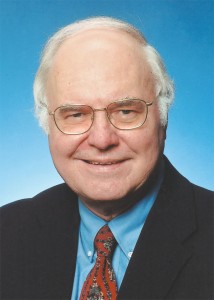  What a gift he is to all of us and what a profound sage of wisdom…when he so-gently speaks, I listen….we all should!  In “Living the Call: An Introduction to the Lay Vocation“, Michael, along with his co-author William E. Simon, Jr, establishes, in Part 1, of the book, the need for the lay vocation in the Church today.  They chronicle that need with a national and global perspective.  They also present how “living the call”  looks in the lives of nine committed  lay faithful working in parish life today.
 What a gift he is to all of us and what a profound sage of wisdom…when he so-gently speaks, I listen….we all should!  In “Living the Call: An Introduction to the Lay Vocation“, Michael, along with his co-author William E. Simon, Jr, establishes, in Part 1, of the book, the need for the lay vocation in the Church today.  They chronicle that need with a national and global perspective.  They also present how “living the call”  looks in the lives of nine committed  lay faithful working in parish life today.
Part 2 is worth it’s weight in gold! It outlines the absolute necessity of  growth in the interior life of the laity.  How essential it is to deepen the spiritual life .  They give voice to  the need to appreciate the desert experiences of our lives as an opportunities for greater unity with Christ; such periods provide the fonts of grace which nurtures the work in ministry.  For anyone  who severs in ministry of any kind, either as an employee or as a volunteer, if you pass this indispensable book by, you do so at your own peril!
[powerpress]
Michael Novak’s website can be found here
 You can find “Living the Call” here
“This is the book that countless Catholic laypeople have been waiting for as they ponder how to respond to Vatican II’s challenge to take more active roles in the life of the Church and to bring Christian principles to life in the secular world. It’s a gem of a book that speaks to laypeople in all walks of life and at all stages of their earthly journeys.â€
Mary Ann Glendon, Learned Hand Professor of Law, Harvard University
Tags: catholic, catholic podcast, catholic prayer, cathollc spirituality
This entry was posted on Sunday, August 3rd, 2014 at 7:29 am
You can follow any responses to this entry through the RSS 2.0 feed.
[powerpress]
This program features Fr. Benedict Groeschel teaching and talking about the Catechism and the Bible with an emphasis on prayer. His discussion of prayer is based on the premise that an essential condition of prayer is devotion- the belief that God is listening and cares for us. In “Prayer in the Catechism”, Fr. Groeschel discusses the various kinds of prayer, including a special emphasis on using scripture when praying. The catechism contains basic Christian teaching formatted for learning and understanding. More information about the Catechism of the Catholic Church may be found on the United States Conference of Catholic Bishops website.
Benedict Joseph Groeschel, CFR is a Catholic priest, retreat master, author, psychologist, activist and has hosted several television programs. He was the director of the Office for Spiritual Development for the Catholic Archdiocese of New York as well as associate director of Trinity Retreat and the executive director of The St. Francis House. He was professor of pastoral psychology at St. Joseph’s Seminary in New York and an adjunct professor at the Institute for Psychological Sciences in Arlington, Virginia.
This program is a production of Pauline Media and the Daughters of St. Paul copyright 1997. Â For more from Pauline Media visit here
Tags: Benedict Groeschel, Catechism, catholic, catholic podcast, catholic prayer, cathollc spirituality, Joseph Groeschel
This entry was posted on Sunday, August 3rd, 2014 at 7:28 am
You can follow any responses to this entry through the RSS 2.0 feed.
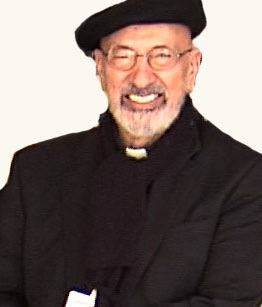 BKL 71 ” Building a Kingdom of Love” – “They all ate and were satisfied” Â
BKL 71 ” Building a Kingdom of Love” – “They all ate and were satisfied” Â
[powerpress]
Gospel MT 14:13-21
When Jesus heard of the death of John the Baptist,
he withdrew in a boat to a deserted place by himself.
The crowds heard of this and followed him on foot from their towns.
When he disembarked and saw the vast crowd,
his heart was moved with pity for them, and he cured their sick.
When it was evening, the disciples approached him and said,
“This is a deserted place and it is already late;
dismiss the crowds so that they can go to the villages
and buy food for themselves.â€
Jesus said to them, “There is no need for them to go away;
give them some food yourselves.â€
But they said to him,
“Five loaves and two fish are all we have here.â€
Then he said, “Bring them here to me, â€
and he ordered the crowds to sit down on the grass.
Taking the five loaves and the two fish, and looking up to heaven,
he said the blessing, broke the loaves,
and gave them to the disciples,
who in turn gave them to the crowds.
They all ate and were satisfied,
and they picked up the fragments left over—
twelve wicker baskets full.
Those who ate were about five thousand men,
not counting women and children.
Msgr. John A. Esseff is a Roman Catholic priest in the Diocese of Scranton. He was ordained on May 30th 1953, by the late Bishop William J. Hafey, D.D. at St. Peter’s Cathedral in Scranton, PA. Msgr. Esseff served a retreat director and confessor to Blessed Mother Teresa. He continues to offer direction and retreats for the sisters of the missionaries of charity around the world. Msgr. Esseff encountered St. Padre Pio, who would become a spiritual father to him. He has lived in areas around the world, serving in the Pontifical missions, a Catholic organization established by Bl. Pope John Paul II to bring the Good News to the world especially to the poor. Msgr. Esseff assisted the founders of the Institute for Priestly Formation and continues to serve as a spiritual director for the Institute. He continues to serve as a retreat leader and director to bishops, priests and sisters and seminarians and other religious leaders around the world.   To obtain a copy of Msgr. Esseff’s book by visiting here  Be sure to visit Msgr. Esseff’s website “Building a Kingdom of Love“
 To obtain a copy of Msgr. Esseff’s book by visiting here  Be sure to visit Msgr. Esseff’s website “Building a Kingdom of Love“
Tags: catholic, catholic podcast, catholic prayer, cathollc spirituality
This entry was posted on Sunday, August 3rd, 2014 at 7:27 am
You can follow any responses to this entry through the RSS 2.0 feed.
Jesus looked up to heaven and blessed the loaves and fishes
[powerpress]
an excerpt from today’s reflection by Don Schwager:
Jesus’ feeding of the five thousand is the only miracle recorded in all four Gospel accounts (Luke 9:10-17, Mark 6:34-44, John 6:51-58, Matthew 14:13-21). What is the significance of this miracle? The miraculous feeding of such a great multitude recalled the miraculous provision of manna in the wilderness under Moses’ leadership and intercession for his people (Exodus 16). The daily provision of food for the people of Israel during their forty years of journeying in the barren wilderness foreshadowed the true heavenly bread which Jesus would pass on to his disciples at his last supper meal on the eve of his sacrifice on the cross. Jesus makes a claim which only God can make: He is the true bread of heaven that can satisfy the deepest hunger we experience (John 6:32-35). The miracle of the multiplication of the loaves, when Jesus said the blessing, broke and distributed the loaves through his disciples to feed the multitude, is a sign that prefigures the superabundance of the unique bread of the Eucharist, or Lord’s Supper which sustains us on our journey to the kingdom of heaven.
“Lord Jesus Christ, you satisfy the deepest longings of our hearts and you feed us with the finest of wheat (Psalm 81:16). Fill me with gratitude for your blessings and give me a generous heart that I may freely share with others what you have given to me.”
for the full reflection visit : Daily Reading and Meditation
Tags: catholic, catholic podcast, catholic prayer, cathollc spirituality
This entry was posted on Sunday, August 3rd, 2014 at 6:55 am
You can follow any responses to this entry through the RSS 2.0 feed.
The Nine Ways of Prayer of St. Dominic
[powerpress]
The Fourth Way of Prayer
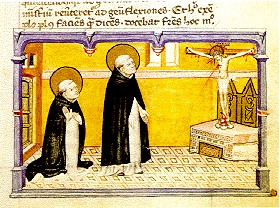 After this, Saint Dominic would remain before the altar or in the chapter room with his gaze fixed on the Crucified One, looking upon Him with perfect attention. He genuflected frequently, again and again. He would continue sometimes from after Compline until midnight, now rising, now kneeling again, like the apostle Saint James, or the leper of the gospel who said on bended knee: “Lord, if thou wilt, thou canst make me clean” [Matt. 8:2]. He was like Saint Stephen who knelt and called out with a loud cry: “Lord, do not lay this sin against them” [Acts 7:60]. Thus there was formed in our holy father, Saint Dominic, a great confidence in God’s mercy towards himself, all sinners, and for the perseverance of the younger brethren whom he sent forth to preach to souls. Sometimes he could not even restrain his voice, and the friars would hear him murmuring: “Unto thee will I cry, O Lord: O my God, be not thou silent to me: lest if thou be silent to me, I become like them that go down into the pit” [Ps. 27:1] and comparable phrases from the Sacred Scripture.
After this, Saint Dominic would remain before the altar or in the chapter room with his gaze fixed on the Crucified One, looking upon Him with perfect attention. He genuflected frequently, again and again. He would continue sometimes from after Compline until midnight, now rising, now kneeling again, like the apostle Saint James, or the leper of the gospel who said on bended knee: “Lord, if thou wilt, thou canst make me clean” [Matt. 8:2]. He was like Saint Stephen who knelt and called out with a loud cry: “Lord, do not lay this sin against them” [Acts 7:60]. Thus there was formed in our holy father, Saint Dominic, a great confidence in God’s mercy towards himself, all sinners, and for the perseverance of the younger brethren whom he sent forth to preach to souls. Sometimes he could not even restrain his voice, and the friars would hear him murmuring: “Unto thee will I cry, O Lord: O my God, be not thou silent to me: lest if thou be silent to me, I become like them that go down into the pit” [Ps. 27:1] and comparable phrases from the Sacred Scripture.
At other times, however, he spoke within himself and his voice could not be heard. He would remain in genuflection for a long while, rapt in spirit; on occasion, while in this position, it appeared from his face that his mind had penetrated heaven and soon he reflected an intense joy as he wiped away the flowing tears. He was in a stage of longing and anticipation like a thirsty man who has reached a spring, and like a traveler who is at last approaching his homeland. Then he would become more absorbed and ardent as he moved in an agile manner but with great grace, now arising, now genuflecting. He was so accustomed to bend his knees to God in this way that when he traveled, in the inns after a weary journey, or along the wayside while his companions rested or slept, he would return to these genuflections, his own intimate and personal form of worship. This way of prayer he taught his brethren more by example than by words.
The text was taken from the book St. Dominic: Biographical Documents, edited by Fr. Francis C. Lehner, O.P. The chapter “The Nine Ways of Prayer of St. Dominic” was translated by Fr. Andrew Kolzow, O.P.
“The Nine Ways of Prayer of St. Dominic” from St. Dominic: Biographical Documents, © 1964 by The Thomist Press.
Nihil obstat: Reverend A. D. Lee, O.P. Censor Deputatus
Imprimatur: Patrick A. O’Boyle Archbishop of Washington
April 29,1964
For the complete list visit: Â 
The Nine Ways of Prayer of St. Dominic
Tags: catholic, catholic podcast, catholic prayer, cathollc spirituality
This entry was posted on Sunday, August 3rd, 2014 at 6:22 am
You can follow any responses to this entry through the RSS 2.0 feed.
Day 2
From a letter to St. Agnes of Prague
“…you might totally love Him who gave Himself totally out of love for you, whose beauty the sun and moon admire, and whose rewards, in both their preciousness and magnitude, are without end. I am speaking about the Son of the Most High, to whom the Virgin gave birth and, after whose birth, she remained a virgin. May you cling to his most sweet Mother, who gave birth to the kind of Son whom the heavens could not contain, and yet, she carried him in the tiny enclosure of her sacred womb.”
Dear St. Clare,
As a young girl you imitated your mother’s love for the poor of your native Assisi.
Inspired by the preaching of St. Francis, who sang enthusiastically of His Lord Jesus and Lady Poverty, you gave your life to Jesus at nineteen years of age, allowing St. Francis to cut off your beautiful hair and invest you with the Franciscan habit.
All through your life you offered your great suffering for your Sisters, the Poor Clares, and the conversion of souls. You greatly aided St. Francis with his new order, carrying on his spirit in the Franciscans after his death.
Most of all you had a deep love of Jesus in the Most Blessed Sacrament, which fueled your vocation to love and care for the poor.
Please pray for me (mention your request) that I will seek to keep Jesus as my first love, as you did. Help me to grow in love of the Blessed Sacrament, to care for the poor, and to offer my whole life to God.
Heavenly Father, thank You for the gift of St. Clare. Through her intercession, please hear and answer my prayer, in the name of Jesus Your Son.
Amen.
For the complete novena visit the St. Clare Novena Discerning Hearts Page
Tags: catholic, catholic podcast, catholic prayer, cathollc spirituality
This entry was posted on Sunday, August 3rd, 2014 at 5:54 am
You can follow any responses to this entry through the RSS 2.0 feed.
Herod’s reaction to John the Baptist
[powerpress]
an excerpt from today’s reflection by Don Schwager:
Unfortunately for Herod, he could not rid himself of sin by ridding himself of the man who confronted him with his sin. Herod’s power and influence was badly flawed. He could take a strong stand on the wrong things when he knew the right. Such a stand, however, was a sign of weakness and cowardice. Where do you get the strength of will and heart to choose what is right and to reject what is bad?
The Lord Jesus gives grace and help to the humble, to those who acknowledge their weanesses and their sinfulness, and who look to God for his mercy and pardon, wisdom and strength. His grace and pardon not only frees us from a guilty conscience, it enables us to pursue holiness in every area of our lives, in our thoughts and intentions as well as our words and actions.
God’s grace enables us to fight fear with faith and to overcome the temptation to compromise good with evil. Do you rely on God’s grace and help to choose his way of holiness and to reject whatever would weaken your faith and loyalty to Jesus Christ?
“Heavenly Father, form in me the likeness of your Son Jesus that I may imitate him in word and deed. Help me to live the gospel faithfully and give me the strength and courage I need to not shrink back in the face of hardship and temptation.”
for the full reflection visit : Daily Reading and Meditation
Tags: catholic, catholic podcast, catholic prayer, cathollc spirituality
This entry was posted on Saturday, August 2nd, 2014 at 3:04 pm
You can follow any responses to this entry through the RSS 2.0 feed.
The Nine Ways of Prayer of St. Dominic
[powerpress]
The Third Way of Prayer
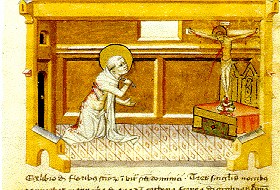 At the end of the prayer which has just been described, Saint Dominic would rise from the ground and give himself the discipline with an iron chain, saying, “Thy discipline has corrected me unto the end” [Ps. 17:36]. This is why the Order decreed, in memory of his example, that all the brethren should receive the discipline with wooden switches upon their shoulders as they were bowing down in worship and reciting the psalm “Miserere” or “De Profundis” after Compline on ferial days. This is performed for their own faults or for those of others whose alms they receive and rely upon. No matter how sinless he may be, no one is to desist from this holy example which is shown in the drawing.
At the end of the prayer which has just been described, Saint Dominic would rise from the ground and give himself the discipline with an iron chain, saying, “Thy discipline has corrected me unto the end” [Ps. 17:36]. This is why the Order decreed, in memory of his example, that all the brethren should receive the discipline with wooden switches upon their shoulders as they were bowing down in worship and reciting the psalm “Miserere” or “De Profundis” after Compline on ferial days. This is performed for their own faults or for those of others whose alms they receive and rely upon. No matter how sinless he may be, no one is to desist from this holy example which is shown in the drawing.
The text was taken from the book St. Dominic: Biographical Documents, edited by Fr. Francis C. Lehner, O.P. The chapter “The Nine Ways of Prayer of St. Dominic” was translated by Fr. Andrew Kolzow, O.P.
“The Nine Ways of Prayer of St. Dominic” from St. Dominic: Biographical Documents, © 1964 by The Thomist Press.
Nihil obstat: Reverend A. D. Lee, O.P. Censor Deputatus
Imprimatur: Patrick A. O’Boyle Archbishop of Washington
April 29,1964
For the complete list visit: Â 
The Nine Ways of Prayer of St. Dominic
Tags: catholic, catholic podcast, catholic prayer, cathollc spirituality
This entry was posted on Saturday, August 2nd, 2014 at 2:53 pm
You can follow any responses to this entry through the RSS 2.0 feed.
Day 1
From a letter to St. Agnes of Prague
Place your mind in the mirror of eternity;
Place your soul in the splendour of glory;
Place your heart in the figure of the divine substance;
And, through contemplation, transform your entire being into the image of the Divine One himself,
So that you, yourself, may also experience what his friends experience when they taste the hidden sweetness that God alone has kept from the beginning
For those who love him.
Dear St. Clare,
As a young girl you imitated your mother’s love for the poor of your native Assisi.
Inspired by the preaching of St. Francis, who sang enthusiastically of His Lord Jesus and Lady Poverty, you gave your life to Jesus at nineteen years of age, allowing St. Francis to cut off your beautiful hair and invest you with the Franciscan habit.
All through your life you offered your great suffering for your Sisters, the Poor Clares, and the conversion of souls. You greatly aided St. Francis with his new order, carrying on his spirit in the Franciscans after his death.
Most of all you had a deep love of Jesus in the Most Blessed Sacrament, which fueled your vocation to love and care for the poor.
Please pray for me (mention your request) that I will seek to keep Jesus as my first love, as you did. Help me to grow in love of the Blessed Sacrament, to care for the poor, and to offer my whole life to God.
Heavenly Father, thank You for the gift of St. Clare. Through her intercession, please hear and answer my prayer, in the name of Jesus Your Son.
Amen.
For the complete novena visit the St. Clare Novena Discerning Hearts Page
Tags: catholic, catholic podcast, catholic prayer, cathollc spirituality
This entry was posted on Saturday, August 2nd, 2014 at 5:23 am
You can follow any responses to this entry through the RSS 2.0 feed.
Episode 2- What is the relationship between religion and science?
[powerpress]
Question 1 Article 2. Whether sacred doctrine is a science.
Objection 1:Â It seems that sacred doctrine is not a science. For every science proceeds from self-evident principles. But sacred doctrine proceeds from articles of faith which are not self-evident, since their truth is not admitted by all: “For all men have not faith” (2 Thess. 3:2). Therefore sacred doctrine is not a science.
Objection 2:Â Further, no science deals with individual facts. But this sacred science treats of individual facts, such as the deeds of Abraham, Isaac and Jacob and such like. Therefore sacred doctrine is not a science.
On the contrary, Augustine says (De Trin. xiv, 1) “to this science alone belongs that whereby saving faith is begotten, nourished, protected and strengthened.” But this can be said of no science except sacred doctrine. Therefore sacred doctrine is a science.
I answer that, Sacred doctrine is a science. We must bear in mind that there are two kinds of sciences. There are some which proceed from a principle known by the natural light of intelligence, such as arithmetic and geometry and the like. There are some which proceed from principles known by the light of a higher science: thus the science of perspective proceeds from principles established by geometry, and music from principles established by arithmetic. So it is that sacred doctrine is a science because it proceeds from principles established by the light of a higher science, namely, the science of God and the blessed. Hence, just as the musician accepts on authority the principles taught him by the mathematician, so sacred science is established on principles revealed by God.
Reply to Objection 1:Â The principles of any science are either in themselves self-evident, or reducible to the conclusions of a higher science; and such, as we have said, are the principles of sacred doctrine.
Reply to Objection 2:Â Individual facts are treated of in sacred doctrine, not because it is concerned with them principally, but they are introduced rather both as examples to be followed in our lives (as in moral sciences) and in order to establish the authority of those men through whom the divine revelation, on which this sacred scripture or doctrine is based, has come down to us.
For an online version of St. Thomas Aquinas’ “Summa” click here
“Christian Apologetics with Dr. R. R. Reno” explores numerous facets of faith and reason in the life of the Church and the world. Grounded on the work of giants, such as St. Thomas Aquinas, St. Bonaventure, Blessed John Newman, soon-to-be Blessed John Paul II, G. K. Chesterton, Blaise Paschal and Stephen Barr, Dr. Reno helps us to open our minds to make the journey to our hearts.
R. R. Reno is the editor at First Things: A Journal of Religion, Culture, and Public Life, and Professor of Theology, currently on leave from Creighton University. His theological work has been published in many academic journals. Essays and opinion pieces on religion, public life, contemporary culture, and current events have appeared in Commentary, and the Washington Post. In Fighting the Noonday Devil Reno suggests that putting ourselves at the disposal of what is real is what trains us for true piety. His other recent books include Genesis: Brazos Theological Commentary on the Bible and Sanctified Vision: An Introduction to Early Christian Interpretation of the Bible.
Tags: catholic, catholic podcast, catholic prayer, cathollc spirituality
This entry was posted on Friday, August 1st, 2014 at 8:40 am
You can follow any responses to this entry through the RSS 2.0 feed.
Episode 5– Light in the Dark Ages
The Resilient Church with Mike Aquilina, offers a fascinating look at the trials and triumphs of the Catholic Church over the past two thousand years. Fast-paced sketches of critical periods in church history give readers perspective on the challenges faced by the church today. Mike Aquilina does not shrink from the realities of the past, including badly behaved leaders and those who betrayed the Lord. Yet he also leaves us all with well-founded hope for the future: God remains faithful in every circumstance and fulfills his promise to remain with his church always. Hosted by Kris McGregor
Also visit Mike’s “Discerning Hearts†page for more audio downloads and information!
Tags: catholic, catholic podcast, catholic prayer, cathollc spirituality
This entry was posted on Friday, August 1st, 2014 at 8:27 am
You can follow any responses to this entry through the RSS 2.0 feed.
The Sunday, Sunday, Sunday Podcast is a reflection on the upcoming Sunday Mass readings presented by LifeTeen.com and hosted by Mark Hart.
Sunday Readings from the USCCB
Reading 1 Â IS 55:1-3
Responsorial Psalm   PS 145:8-9, 15-16, 17-18
Reading 2 Â ROM 8:35, 37-39
Gospel   MT 14:13-21
When Jesus heard of the death of John the Baptist,
he withdrew in a boat to a deserted place by himself.
The crowds heard of this and followed him on foot from their towns.
When he disembarked and saw the vast crowd,
his heart was moved with pity for them, and he cured their sick.
When it was evening, the disciples approached him and said,
“This is a deserted place and it is already late;
dismiss the crowds so that they can go to the villages
and buy food for themselves.â€
Jesus said to them, “There is no need for them to go away;
give them some food yourselves.â€
But they said to him,
“Five loaves and two fish are all we have here.â€
Then he said, “Bring them here to me, â€
and he ordered the crowds to sit down on the grass.
Taking the five loaves and the two fish, and looking up to heaven,
he said the blessing, broke the loaves,
and gave them to the disciples,
who in turn gave them to the crowds.
They all ate and were satisfied,
and they picked up the fragments left over—
twelve wicker baskets full.
Those who ate were about five thousand men,
not counting women and children.
Tags: catholic, catholic podcast, catholic prayer, cathollc spirituality
This entry was posted on Friday, August 1st, 2014 at 8:19 am
You can follow any responses to this entry through the RSS 2.0 feed.
The Nine Ways of Prayer of St. Dominic
[powerpress]
The Second Way of Prayer
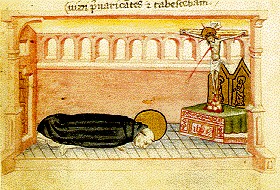 St. Dominic used to pray by throwing himself outstretched upon the ground, lying on his face. He would feel great remorse in his heart and call to mind those words of the Gospel, saying sometimes in a voice loud enough to be heard: “O God, be merciful to me, a sinner.” [Luke 18:13] With devotion and reverence he repeated that verse of David: “I am he that has sinned, I have done wickedly.” [II Kings 24:17]. Then he would weep and groan vehemently and say: “I am not worthy to see the heights of heaven because of the greatness of my iniquity, for I have aroused thy anger and done what is evil in thy sight”(28). From the psalm: “Deus auribus nostris audivimus” he said fervently and devoutly: “For our soul is cast down to the dust, our belly is flat on the earth!” [Ps. 43:25]. To this he would add: “My soul is prostrate in the dust; quicken thou me according to thy word” [Ps. 118:25].
St. Dominic used to pray by throwing himself outstretched upon the ground, lying on his face. He would feel great remorse in his heart and call to mind those words of the Gospel, saying sometimes in a voice loud enough to be heard: “O God, be merciful to me, a sinner.” [Luke 18:13] With devotion and reverence he repeated that verse of David: “I am he that has sinned, I have done wickedly.” [II Kings 24:17]. Then he would weep and groan vehemently and say: “I am not worthy to see the heights of heaven because of the greatness of my iniquity, for I have aroused thy anger and done what is evil in thy sight”(28). From the psalm: “Deus auribus nostris audivimus” he said fervently and devoutly: “For our soul is cast down to the dust, our belly is flat on the earth!” [Ps. 43:25]. To this he would add: “My soul is prostrate in the dust; quicken thou me according to thy word” [Ps. 118:25].
Wishing to teach the brethren to pray reverently, he would sometimes say to them: When those devout Magi entered the dwelling they found the child with Mary, his mother, and falling down they worshipped him. There is no doubt that we too have found the God-Man with Mary, his handmaid. “Come, let us adore and fall down in prostration before God, and let us weep before God, and let us weep before the Lord that made us” [Ps. 94:61. He would also exhort the young men, and say to them: If you cannot weep for your own sins because you have none, remember that there are many sinners who can be disposed for mercy and charity. It was for these that the prophets lamented; and when Jesus saw them, he wept bitterly. The holy David also wept as he said: “I beheld the transgressors and began to grieve” [Ps. 118:158].
The text was taken from the book St. Dominic: Biographical Documents, edited by Fr. Francis C. Lehner, O.P. The chapter “The Nine Ways of Prayer of St. Dominic” was translated by Fr. Andrew Kolzow, O.P.
“The Nine Ways of Prayer of St. Dominic” from St. Dominic: Biographical Documents, © 1964 by The Thomist Press.
Nihil obstat: Reverend A. D. Lee, O.P. Censor Deputatus
Imprimatur: Patrick A. O’Boyle Archbishop of Washington
April 29,1964
For the complete list visit: Â 
The Nine Ways of Prayer of St. Dominic
Tags: catholic, catholic podcast, catholic prayer, cathollc spirituality
This entry was posted on Friday, August 1st, 2014 at 5:45 am
You can follow any responses to this entry through the RSS 2.0 feed.

